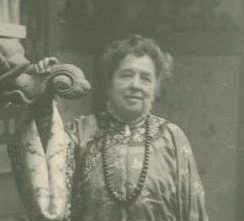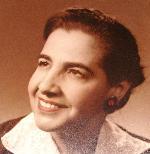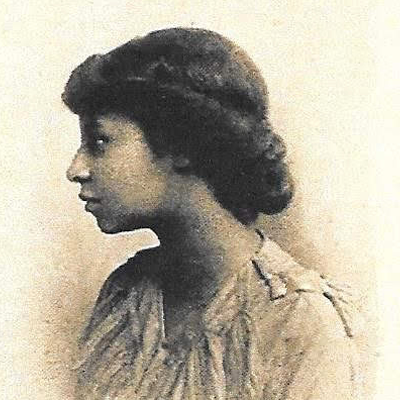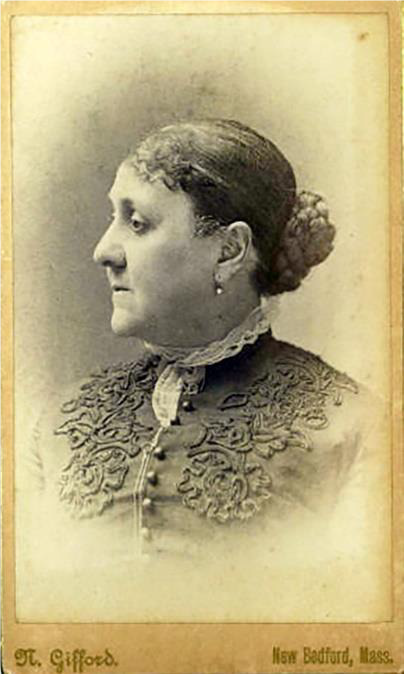Passionate about making sure that she and fellow factory workers were compensated fairly, Aurélia Lebeau (1874-1955) became one of the first female textile union leaders in New England. In her position as secretary of the New Bedford chapter of the Amalgamated Textile Workers’ Union, she led hundreds of factory workers on a strike for better wages. Later, she raised funds in Montreal to support the strikers in the New Bedford textile strike of 1928.
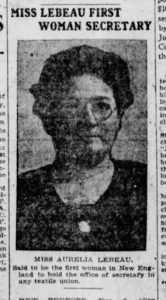
Textile union leader Aurélia Benoît Lebeau (1874-1955) was born on July 26, 1874, in Oxford, Massachusetts. She was born to a French-Canadian father, Charles Benoît, and an American mother, Maria Morse Benoît. Her father and older siblings were shoemakers and mill workers–and she married into a working-class family as well. Aurélia, her French-Canadian husband Adolphus, and their younger son Charles all earned their livelihoods working in New Bedford’s textile mills.
In the early to mid-1900s, she worked with and was a leader in many unions and charitable organizations in New Bedford, including the Ladies’ Catholic Benevolent Association, the Yarn Finishers’ Union, the Amalgamated Textile Workers Union, the Textile Council, l’Union St. Jean Baptiste d’Amerique, and the New Bedford Grange.
Passionate about making sure that she and fellow factory workers were compensated fairly, Aurélia became one of the first female textile union leaders in New England. She was the first woman to become a secretary of a textile union in New England. In her position as secretary of the New Bedford chapter of the Amalgamated Textile Workers’ Union, she led hundreds of factory workers on a strike for better wages. Later, she raised funds in Montreal to support the strikers in the New Bedford textile strike of 1928.
Aurélia was a staunch supporter of workers’ rights. Her work as an assistant secretary and secretary of the Yarn Finishers’ Union–later the New Bedford chapter of the Amalgamated Textile Workers’ Union–led her to help facilitate several worker strikes in the region in the 1910s and 1920s. She would lead meetings of strikers, post notices in newspapers, speak to the press, report grievances to the mayor, and sometimes be the only female speaker at union meetings. The first strike she worked on was that of several dozen workers at the Gilt Edge Silk Mills. The strikers she was working with wanted a pay increase to match the pay of their peers at other mills in the New Bedford area. She also involved herself in a strike at the National Spun Silk mill in 1920, which peaked at over 1,000 participating workers. Aurélia felt very strongly in support of the silk workers’ cause and went so far as to denounce those who did not support it. She spoke with New Bedford’s own Evening Standard in March of 1920 and said that, due to the inaction of other union leaders, it had become “necessary for [her] to interest [herself] in matters that did not directly concern [her] in order to see justice done.”
During the New Bedford textile strike of 1928 (see also Eulalia Mendes and Dora Bastarache), Aurélia found work for herself again. This was a prolific strike that involved over 20,000 strikers and lasted for seven months. During the fifth month of the strike, she traveled to Montréal, Canada seeking aid for the striking workers in the name of the Textile Council. One of Montréal’s French- and English-language newspapers Le Monde Ouvrier (the Labor World) reported that not only did Organized Labor of Montréal contribute financially to the New Bedford strikers’ cause but they also encouraged other Canadian labor unions to do the same. They only came to this decision because Aurélia went before the Montréal Trades and Labor Council and “made a strong plea in [the workers’] favor.” According to Le Monde Ouvrier, “She told a pathetic story of bread lines of families of the strikers lined up to receive food at stated hours and places. She said that the strike involved 27 corporations and 28,000 workers.” Due to her advocacy, the 1928 strikers received vital assistance.
Towards the end of her life, Aurélia Benoît Lebeau continued her activism as a master and member of the New Bedford Grange, where she helped plan banquets, fairs, card parties, and other events for the benefit of the community. She passed away in 1955 in New Bedford.
Kayla Allen, Intern, University of Massachusetts Boston with some sources from Dr. Alfred H. Saulniers, educator, economist, historian, and author
Information from
- “1870 United States Federal Census,” s.v. “Charles Benway” (Benoit) (1834-1882), Ancestry.com.
- “1880 United States Federal Census,” s.v. “Charles Benway” (Benoit) (1834-1882), Ancestry.com.
- “1900 United States Federal Census,” v.s. “Aurelia Le Beau” (1874-1955), Ancestry.com.
- “1910 United States Federal Census,” v.s. “Aurelia Lebeau” (1874-1955), Ancestry.com.
- Boston Post (Boston, MA), 9 Nov. 1919, p. 6. MyHeritage Library Edition.
- “Claim Thousand Silk Strikers: Girls Swell Ranks of Amalgamated Meeting This Morning—Simpson Attacked.” Evening Standard (New Bedford, MA), 11 Mar. 1920. MyHeritage Library Edition.
- “Council Has Meeting.” The Standard-Times (New Bedford, MA), 8 Oct. 1948, p. 7. MyHeritage Library Edition.
- “Help for Textile Strikers.” Le Monde Ouvrier (Montréal, Canada), 4 Aug. 1928, https://numerique.banq.qc.ca/patrimoine/details/52327/3305433.
- La Presse (Montréal, Canada), 10 Aug. 1928, Collections de BAnQ. https://numerique.banq.qc.ca/patrimoine/details/52327/2972587?docsearchtext=Aurelia%20%20New%20Bedford.
- “Massachusetts, U.S., Death Index, 1901-1980,” s.v. “Aurelia Lebeau” (1874-1955), Ancestry.com.
- “Massachusetts, U.S., Town and Vital Records, 1620-1988,” Oxford, MA. s.v. “Aurelia Benway” (Benoit) (1874-1955), Ancestry.com.
- “Miss Lebeau First Woman Secretary.” Boston Post (Boston, MA), 9 Nov. 1919, p. 6. MyHeritage Library Edition.
- “Organization Meeting.” Evening Standard (New Bedford, MA), 20 Mar. 1920, p. 4. MyHeritage Library Edition.
- “Past Masters Preside for New Bedford Grange,” The Standard-Times (New Bedford, MA), 18 Mar. 1948, p. 8. MyHeritage Library Edition.
- “Silk Weavers Seeking 25 P.C.” Evening Standard (New Bedford, MA), 9 Dec. 1919.
- “Silk Workers Go on Strike.” Boston Post (Boston, MA), 10 Mar. 1920, p. 22. MyHeritage Library Edition.
- “Surprise for Mrs. Charron.” Evening Standard (New Bedford, MA), 17 July 1917, p. 3. MyHeritage Library Edition.
![[Aurélia Benoît Lebeau], August 10, 1928, Newspaper clipping, La Presse (Montréal, Canada), Collections de BAnQ, https://numerique.banq.qc.ca/patrimoine/details/52327/2972587?docsearchtext=Aurelia%20%20New%20Bedford photo of Aurélia Benoît Lebeau](https://historicwomensouthcoast.org/wp-content/uploads/2022/04/Aurelia-profile-image-e1649345547736-289x289.jpeg)

